Corinne Ramey
Liveblogging “Women’s Equality… Why Not Now?”
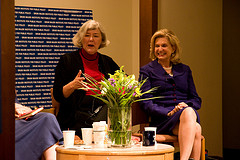 Have women really broken through the glass ceiling? I'm hoping that this morning's book discussion -- on the status of women in society and the policies necessary to close the gender gap -- will answer that question.
Have women really broken through the glass ceiling? I'm hoping that this morning's book discussion -- on the status of women in society and the policies necessary to close the gender gap -- will answer that question.
I'm here at NYU's Kimmel Center, waiting for the event to begin. This morning the panel will be discussing Congresswoman Carolyn B. Maloney's new book, Rumors of Our Progress have been Greatly Exaggerated: Why Women’s Lives Aren’t Getting any Easier—and How We can Make Real Progress for Ourselves and Our Daughters. 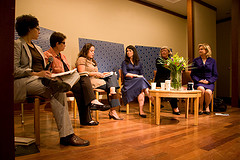 Joining Maloney is a fantastic panel including Hon. Christine Quinn, Speaker of the New York City Council, Diana Salas, Associate Director of the Women of Color Policy Network, Congresswoman Pat Schroeder, President and CEO of the American Association of Publishers, Inc., Olga Vives, Executive Vice President of the National Organization for Women, and Lisa Witter, Chief Operating Officer of Fenton Communications. DMI's Andrea Batista Schlesinger will be moderating the panel.
Joining Maloney is a fantastic panel including Hon. Christine Quinn, Speaker of the New York City Council, Diana Salas, Associate Director of the Women of Color Policy Network, Congresswoman Pat Schroeder, President and CEO of the American Association of Publishers, Inc., Olga Vives, Executive Vice President of the National Organization for Women, and Lisa Witter, Chief Operating Officer of Fenton Communications. DMI's Andrea Batista Schlesinger will be moderating the panel.
I'll be liveblogging the event, so check back for frequent updates! By this afternoon we'll also have photos and YouTube clips available as well.
8:25
Andrea steps up to the podium and starts things off. She begins by introducing Christine Quinn, the speaker of the City Council, and says that Christine is female, openly gay, and Irish. Andrea comments how much energy Christine has on Monday, and Christine walks up to the podium.
Christine begins by thanking DMI "If it weren't for DMI, there wouldn't be a lot of discussion about the needs of middle class New Yorkers." She comments on the inclusion of working families, LGBT people, women, etc. as part of the middle class in New York. "I thank everyone for coming out this morning."
"I've known Carolyn for a long time," she says. When you get a job with a title, sometimes people are nicer to you than before you had that title. She says she knew Carolyn for years, and that Carolyn had always been kind and supportive way before Christine had a title. She's a true feminist who goes out of her way to support women, she says. "She's always pushed me forward."
8:29
She says that Carolyn has done the same with other women councilmembers, staff, and advocates. Christine mentions all the legislation that Carolyn has introduced and passed, giving the VENDEX system as an example.
"The other thing that is exciting about this book...is the end of each chapter," she says. Carolyn doesn't just leave you in the book -- she tells you how to get to what should be, and how to not be satisfied with what is. There is nothing more powerful than an elected official who sees herself as a community organizer. She also talks about Carolyn having a child when she was on the city council. She talks about how it was like someone was having an elephant and the council was shocked. "If Carolyn hadn't been willing to take that risk...then a long list of other women wouldn't have been able to do it without the fear that Carolyn had."
8:33
One of the questions Carolyn proposes in her book is what Congress would be like if it had 16% men instead of 16% women. "It's an incredibly important and energizing question to think about." She has that no one would let that be.
"We can't accept being 16% of Congress." To get there, we have to act as if we're 51% of Congress, of the City Council. That's what Carolyn has always done, and that's how she's shifted the power paradigm.
When we come back to a room like this in five years we'll have made a massive amount of progress. Thanks for coming.
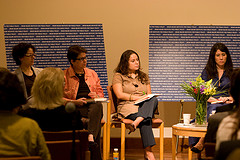 8:35
8:35
Time for the panel (which the women sitting behind me says looks like The View). Andrea begins by introducing the panelists. First is Carolyn Maloney. Andrea asks the same question that Christine proposed. What would Congress look like if it were 16% men?
Carolyn starts with a plug for her book, and mentions Patricia Schroeder. She says that Pat's agenda was always "women, children, and families," and Carolyn looks up to her. She talks about how the National Organization of Women supported her.
We're half the population, she says. "Social scientists tell us you need a base of 30% to bring real change." Women have different priorities, she says. She talks about paid family leave, and how it finally got passed for federal employees. It's good for society and the office and definitely good for mothers and fathers.
8:40
What I've seen in Congress is that rumors of our progress have been exaggerated, she says, referencing the title of her book.
She mentions studies on the glass ceiling, and says that the pay discrepancy has been solid. It's like trying to change George Bush's mind to change the pay gap between men and women. And when women are in management it gets even worse. Middle-management women are the most pessimistic of anyone -- they are hitting a discriminatory wall. Carolyn mentions the Lilly Ledbetter case, a women who had been discriminated against for years and wasn't allowed to ask for back pay because she didn't bring sue within six months of the discrimination. The case eventually made it to the Supreme Court.
Women consider Hillary Clinton's race the most important advancement for women in this country. She ran a magnificent campaign. Carolyn said she gets emails from Hillary supporters who are frustrated about her loss.
She talks about the different chapters in her book, and how it's a positive book, and a how-to guide about how to make change.
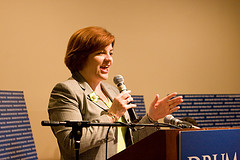 8:44
8:44
What I saw in Congress under the eight years of George Bush was a constant eroding of women's rights. I started a scorecard on choice, she says. There have been 151 votes in Congress chipping away at women's right to choose. She mentions the Family and Medical Leave Act, which was passed in 1993. This was Pat's bill, she says.
They're talking about family values, but where are they? I hope we unify behind Barack Obama and have a Democratic president.
8:46
Andrea introduces Pat Schroeder, who spent 24 years in Congress and is now President and CEO of the American Association of Publishers. Andrea asks her what was different at the time when Pat ran for president.
Pat says she's glad to be here. "When I looked at running for president it was a really different time." She says that as she traveled around the country she felt like a great traveling novelty act. She said journalists would ask "Why are you running as a women?" The audience laughs.
She said people asked her how she could be a congresswoman and a mother. "I have a brain and a uterus and they both work," she says. I found it frustrating that I couldn't break through being a woman. People would say that she "didn't look presidential." The visuals are important, and even males have trouble with the visuals. What does a women do? I think having had women as Secretary of State has helped, she said.
I was the first women on the Arms Services Committee. Members would tell her she shouldn't be on the committee because she hadn't served in the military. "Then we have a lot in common," she would say to them, since most of the men hadn't served either.
8:50
What I really saw for Hillary was that for Hillary it became a kill-the-witch thing. It was like no matter what she did it was wrong. They called her lying or devious or this or that. After she had given an unbelievably good speech, a commentator said she was trying to undermine Obama because he "knows her, and that's the stuff she does." Male candidates just don't have to deal with this stuff.
The other thing we learned is that people don't come forward to fight sexism. They come forward to fight racism, but not sexism. She mentions going to a sporting dinner when she was a young congressmember, and her colleagues told her there were no women at this dinner. "We don't have women here, are you going to walk out or should we carry you out?" they asked. She says that if they were throwing her out because of religion or race they wold have been in trouble, but sex didn't matter.
8:53
It really was in our face, and just underlies everything in your book, she says to Carolyn. Some of it's gone, but we need to be much stronger.
Andrea introduces Diana Salas from the Women of Color Policy Network. I'm a lover of organizations that have "literal names," Andrea jokes, "running the Drum Major Institute."
How do you see the invisibility of women in color in policy? she asks.
8:55
I'd like to thanks Carolyn for the title of this book, Diana begins. It's manifested in a lot of different ways. There's a gender/race dichotomy for women of color, and immigration status is an additional layer. What we're calling for is any policy that comes down the table to be examined through a gender and color lens. We call for a human rights commission in Afghanistan -- we should ratify one here. We don't have full guaranteed human rights in NYC.
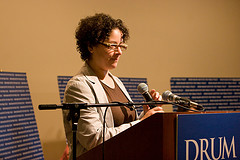
8:57
There's a huge wage gap between women of color and white women. Women of color aren't even making it up to the glass ceiling because they're not there yet. National anti-poverty legislation might be helpful. That's what we're talking about when we talk about women and color at the same time. She talks about young women of color being torn between Obama and Clinton because they felt represented by both. So they moved on to the issues -- who has the best platform?
I think as this country moves forward we have to acknowledge that discrimination still exists. We are all part of this country -- men need to be part of this conversation too. A group of older white men should not be making the decisions for all of us.
8:59
Andrea introduces Olga Vives, Executive Vice President of the National Organization for Women. Do you think these lack of gains are attributable to a lack of political power of women? Andrea asks.
9:00
Olga says yes, and thanks Carolyn for her book. I think women don't understand how far we've gotten and yet how far behind we are. Women will not achieve equality in this country unless we are economically equal. In this particular society money means a lot. If we don't make the same amount of money as men, we'll never be able to get to a 50/50 country where we can all participate equally.
Walmart is the largest employer in the U.S., and they engage in systemic discrimination. This company sets the model. People flock to Walmart because they have lower prices, but why do they have lower prices?
Of the top fortune 500 countries, there are only 11 CEOs that are female. When you get out of college, you can count on making less if you're white, and even less if you're black or Latina.
9:02
I think Sen. Clinton was historic in so many ways, and one of the ways was that she was able to fundraise successfully. No woman has done as well as she did.
I love the take-action guides at the end of each chapter of Carolyn's book. She says that she'll give her daughter the book to encourage her to be an activist. We need action by Congress but also activism on the part of activists.
9:04
Andrea introduces Lisa Witter, author of The She Spot: Why Women Are the Market for Changing the World -- And How to Reach Them.
Andrea mentions policies that affect women -- like paid sick leave -- and asks how they should be addressed. Lisa says that we need to "ditch the niche": the idea that women are some special interest. in this election, we were between 57-59% of people who came out to vote.
She says that women have a generational challenge -- we need to stop framing issues as women issues, or that women only care about abortion. This isn't true, she says. "If you can't see it, you can't be it," she says. We need to put some responsibility on women themselves. We're not running for office as much as men, we're not standing up for ourselves. Op-eds are overwhelmingly written by men.
Women need to push harder and be more visible. Something that my generation has is the Internet. Women are blogging, online. We can make ourselves much more visible, and I'm hoping that younger women can do it.
9:08
When we talk about women voting in their best interest, to what extent is the deep organizing of women around choice responsible for the "nichisization" of choice being viewed as the litmus test of support of women? Is that limiting, or is that the central issue?
Pat starts it off. "You hit on something that I could have answered more affirmatively last week." I had a hard time getting here, and I spent a lot of time watching cable television in airports. She talked about 15 girls in high school signing a pact to have a baby.
But I totally agree with you that the choice thing has been a battle for women. If you can't make choices about your body, how can you do everything else?
But what's happened in the culture, is stammering. Why did these 15 young girls in Massachusetts think it's a great thing to have a baby? They think this will do more for them than any other options. We thought we were putting all those other options on the table for them.
9:11
Carolyn says that the single most indicator for poverty in old age is being a single mother. "I call it the mom bomb," Carolyn says. We don't provide the flex time for mothers to take time off.
She says that sometimes men are allies -- we wouldn't have passed paid family leave without men in Congress. With the FMLA, it wasn't moving until it covered men, and suddenly they were interested.
When I was writing the book, I had this story in there of Pat and Ron Dellums, an African American, sharing the same seat in Congress. We had a share a seat because he said we were half of people.
Pat recalls Barney Frank said that was the only "half ass thing I ever did," and the audience laughs.
9:13
Olga says that women have been fighting for Roe v. Wade, and this is a strategy to keep women busy. We need to make sure that we're working on both ends. The strategy from the opposition has been to keep us down. They elevated the choice issue to get us off equal rights.
She mentions that McCain has always voted anti-choice.
9:14
Carolyn says that business killed the equal rights amendment, and that she agrees with Olga.
Diana says women of color have been using a reproductive justice framework because it allows us to work on issues of reproductive health in multiple social justice movements.
Women face a particular kind of discrimination.
9:17
Lisa says there is always optimism. She mentions the oil crisis, and how this could mean people going into the office less and parents working at home to be with their children. If we use this to change the perspective, and to integrate the women's movement and environmental movement, at least we can get some gains.
Andrea jokes that we generally like at least one moment of optimism at DMI event.
9:18
A guest questioner talks about the 30% number that Carolyn mentioned earlier. Various countries have certain strategies to get a minimum of a third. To what extent does how campaigns are financed in the U.S. make a difference to women able and willing to run? In other countries when there's a party list system there's a greater ability for women.
Pat decides to answer. Women have an easier go of it now than we did originally, She mentions EMILY's List, and that Clinton proved that you can raise a lot of money. She says that women are a harder sell for donations. In politics I could look at what congressmembers around my district were getting, and they would get $100 and I would get $50. I wanted to tell people that I don't get a discount.
We have to, as women, take this on. If we won't even put out what we payed for our last outfit, then that's not enough.
9:20
Lisa chimes in. "It's true, when it comes to giving political donations women are lacking behind men." They feel like they're not being represented by the system. But when women donate to nonprofits, they are there for life. Men are more transactional.
Candidates need to do better at getting female donations. She says that Obama was successful because he asked for small donations, and that this worked with women because statistics show that women are twice as likely to tell their friends as well.
Andrea asks if we should just getting more women elected is enough. Isn't it more damaging when we have very conservative women running for office?
Pat says a lot of women have bought into an issue of "viability." Incumbency keeps women away from gaining. A lot of women are very viable.
Diana says that the Obama and Clinton campaigns were interesting because they forced people to look at the issues.
9:24
Carolyn says that we need more women in the pipeline. We need to give them the support. We have a women's caucus in the Congress, and sometimes Democrats and Republicans don't agree. And sometimes it's better to support someone who agrees with you than a woman.
9:25
A guest questioner says that she works in a union that is mostly men. We're not respected in that union, she says. We try to come to find out what we can do in our union so there's more women involved.
Carolyn says that mentors are important, and that many women have started networks. You can have networks or clubs where you support each other. Madeleine Albright said there's a special place in hell for women that don't help other women.
Carolyn says that Hillary Clinton still couldn't go the Augusta National Golf Club -- the ultimate male network.
I would like to say to some of my male friends, "what if you were paid 20% less if you were a woman?"
9:27
Family values should become a reality, not just a slogan.
Another guest questioner. "It's interesting that as we talk about these issues, Albany is considering paid family leave in NY." But they're getting ready to leave Albany without legislation. She asks Carolyn to ask them not to leave without passing paid leave.
Carolyn says that passing paid family leave was hard, and that even now it has a veto threat -- Bush called it "unnecessary and costly."
I think what you're talking about is another example of women's issues being swept under the rug. In my fight for paid family leave I started out with a nucleus of women who were beating that drum.
People just sat there and took the sexism that was in this campaign. People were holding signs that said "Iron my shirt Sen. Clinton and get out of the race," and no one said anything. But if someone had said "Shine my shoes, Sen. Obama," then people would have called it racism.
It may be good for ratings to call her castrating, but it's an undignified way to talk about a senator.
She mentions a commentator asking Clinton about her sex life, and Carolyn says she called some women and they had a press conference at City Hall. It shut them down, she says. They didn't continue with that conversation once we stood up and said we would call them on it.
9:32
We should form an organization that is a watchdog on sexist comments in campaigns or this treatment of women will continue.
A college student asks a question. Increasingly women aren't going into the workforce, despite the fact that there are more women than men in colleges. What's this disconnect?
Lisa takes the question. I think there are some difficult questions we need to answer as a feminist movement. I think society doesn't support mothers as much as it should. Until we can help mothers and families and anyone who wants a child answer that question, it's difficult.
Carolyn says that there's no support when you have a child. She says that the tax code has a discouragement to stay in the work force, and the cost of child care is so high. Her husband said that her working was actually costing them money. A friend told her that if she dropped out she'd never get back in at the same level.
One of my constituents deducted $700,000 for going to a strip joint with his clients. But women and men can't deduct the price of childcare?
The U.S. ranks 168 in the world in paid family leave. She says that Glamour magazine called her and told her that the statistic was so outrageous they did a fact check on it. "If you look at what's there for families it's very very hard." And single mothers are another story -- they are the largest segment of poverty in old age.
Andrea nods her head in disbelief, and then mentions "the gossip of the book" as an incentive to buy the book.
9:38
How do you see a broader women's agenda shaping up this fall for a general election? asks a guest questioner. Abortion will be there, but is that as far as the discussion is going to go? Or can we take this further and get beyond this issue?
Andrea asks each woman to respond.
Olga says it's clear we don't want a McCain candidacy. He says that women aren't making the same amount of money because they need more education and training. He has no understanding of it, she says. However, I think with Senator Obama we need to sit down with him and say that what's important to women goes beyond abortion. He needs to have women that are women-friendly in important positions.
Andrea repeats that DMI is non-partisan, and the audience laughs.
9:41
Diana says money does talk, and that people need to hold Obama accountable. We have to stop listening to just the soundbites. We should read the entire speech, because when we don't get a clear picture, we only hear what the networks tell us. And we need grassroots organizing at a very local level -- we need to talk about the real issues.
Lisa says that we need to stop fighting the stereotype that women are not in a little pile over here. I think Obama will be great on women's issues because he's great on progressive Democratic issues. And I think he needs to make a commitment to have 50% of his cabinet be women. Michelle Bachelet of Chile did this.
9:43
Carolyn says that women aren't in a niche, and that we have great power. We're just not using it to advance fundamental things like work-family balance. I am going to invite Sen. Obama to a book signing, she says.
We are 50% of the population and we should be 50% of the cabinet positions. The largest contractor in the nation is the federal government, and only 3% of contracts go to women-owned businesses, even though a law says 5%.
If we are unified we can make great progress on these issues, and advance the rights of women. We can't pass the Equal Rights Amendment and even Iraq and Afghanistan passed that! Let's move into the 21st century and get some of these issues enacted into law.
The audience claps, and Andrea says she'll be first in line at the book-signing table.
Check back later today for photos and YouTube clips!
Corinne Ramey: Author Bio | Other Posts
Posted at 8:05 AM, Jun 23, 2008 in
Drum Major Institute | Economic Opportunity | Women
Permalink | Email to Friend










